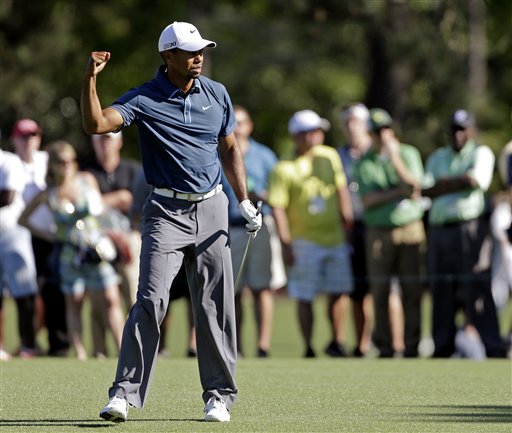AUGUSTA, Ga. - There were 61 of golf's best players at Augusta National on Saturday. They played a total of 1,098 holes that covered 453,535 official yards on the greatest course in the game.
They took 4,504 official shots and decidedly more practice swings and putting moves.
Yet all anyone could talk about during and around the third round of this Masters was two penalty strokes that didn't happen added to one scorecard.
Unless you live under Rock City and are a social-media shut-in, you know full well that Tiger Woods, the golf's No. 1-ranked player and arguably the most recognized athlete on the planet, was assessed a two-shot penalty Saturday morning for an improper drop on No. 15 Friday afternoon. He'll start today four shots off the lead, 3 under par for the tournament.
Oh, if it were only that simple and direct. The layers and depths of this were confounding, at times limitless and in some ways answerless.
"There's not a day that goes by that there are not some things I wish I would have done differently," said Fred Ridley, the chairman of the Masters competition committee.
The examination of Woods' drop was brought on by a call from a fan watching on TV. Ridley and the Augusta rules big shots originally deemed Woods' drop OK while he finished his second round. Another viewer's call to Augusta National noted that Woods said during an interview on ESPN that he meant to drop his ball a couple of yards behind his original spot.
"It shouldn't protect him from not knowing the rules, but it should protect them," Ridley said of Rule 33-7, a recent addition that is designed to protect players from decisions and infractions, mainly those learned from TV coverage, that could lead to penalties. It can allow tournaments to penalize players rather than disqualify them.
After reviewing their decision and changing their mind, the Green Jackets called Tiger to the club early Saturday morning to discuss the situation, and the two-shot penalty was assessed. Some outrage ensued that Tiger should have been DQ-ed because he signed the wrong card -- a card that was right at the time he signed it. And then the dark choppers started swirling, Deep Throat called again and the Zapruder Film was used to assess the hidden 18 minutes of audio tape and determine that Tiger actually was born in Area 51. Whisper it with me, all you fans of the famous 16th hole here, "Rosebud."
Any questions?
There were debates about protecting the integrity of the game and the reputation of the club that presents the finest tournament in the world. There were rumblings about preferential treatment for the game's biggest star and the obvious benefits to CBS of having the game's brightest star on golf's grandest stage. There was outrage about it being a gift for Tiger Woods because he's Tiger Woods, while at the same time there was discussion that being Tiger Woods brings problems of being Tiger Woods, such as everyone watching every shot he takes.
Again, any questions?
The answers, like the rules of the game -- Tiger's violation was not dropping "as close as possible," so there is always room for interpretation -- are dependent on your view.
Here's saying Augusta National got it right in the end. There was a rules violation and there was a penalty levied. The fact the club ruled Woods was in the clear before he signed his card only to change its mind after he signed it makes it impossible to DQ him. Plus, the phone calls and the at-home TV tattletales are at the core of the Rule 33-7.
"It was either no penalty or a two-shot penalty," Ridley said when the committee reconvened this morning with Woods, "but disqualification this morning was not on the table."
Here's saying that if you think Tiger intentionally broke the rule, get a grip. Dude may be a lot of things -- and we know almost all of them and a lot of them are less than admirable -- but do you really believe he would knowingly break the rules with tens of millions of eyeballs on him?
Here's saying the concept of TV viewers calling in for rules violations needs to go the way of balata balls and persimmon woods. It's one thing to have Big Brother always there on the course -- and maybe there should be rules officials with every group, especially here -- but do we really need Cousin Eddie calling penalties and interpreting loose impediments?
Here's saying that the thought of Woods disqualifying himself was never realistic.
"Under the Rules of Golf, I'm abiding by the rules," Woods said after his 2-under 70 Saturday. "They made the determination that nothing had happened, and after what I said things changed. ... I accept their decision."
Woods made a mistake. He paid for it with a two-shot penalty that likely will severely hamper any chances he has at winning the 2013 Masters. Augusta National likely made the bigger mistake by not asking Woods about the drop before he signed the card Friday. In retrospect, the club made the decision to penalize rather than dismiss -- a decision with which Ridley said all the other governing bodies of the game agreed.
It was a ton of wasted energy and angst. Unlike the debate unleashed Friday about the rule of slow play, this was wasted energy, a confounding look at the intricate and confusing crossthreads of new rules and the new world of the grand old game.
Contact Jay Greeson at jgreeson@timesfreepress.com

